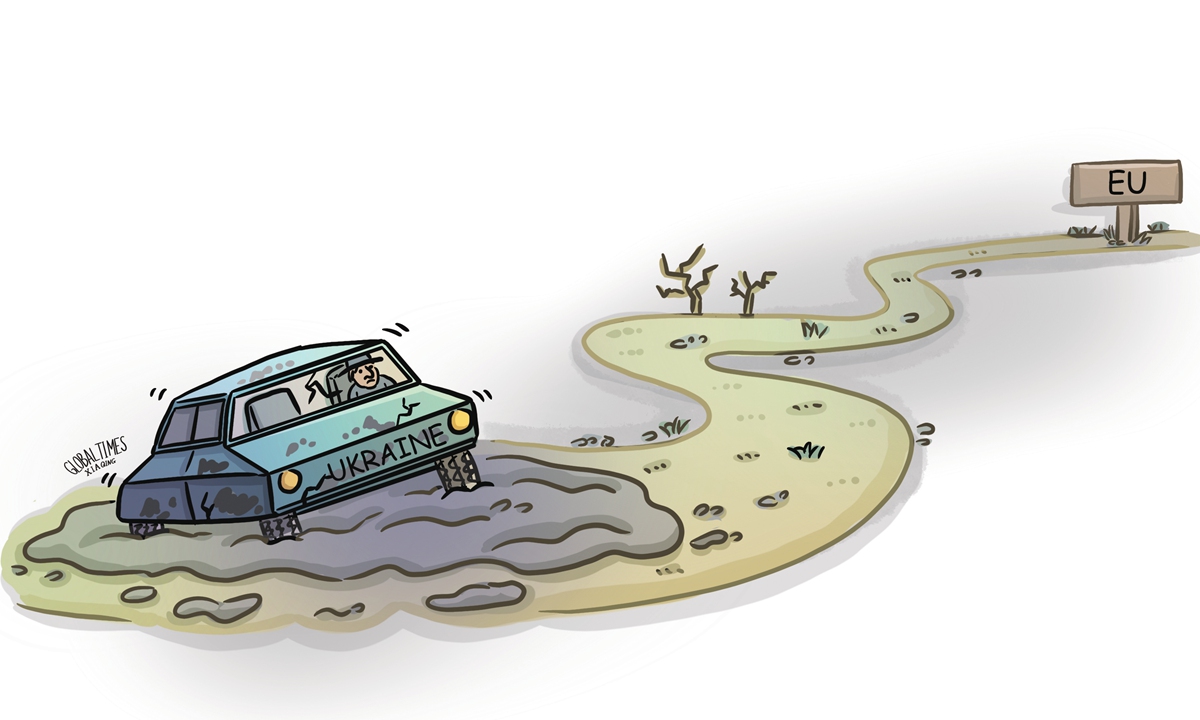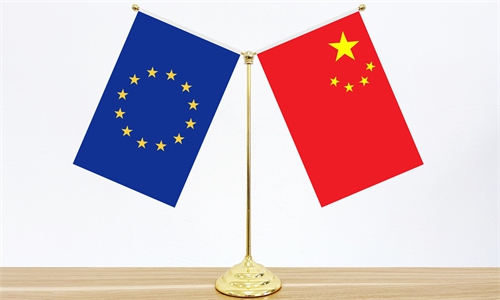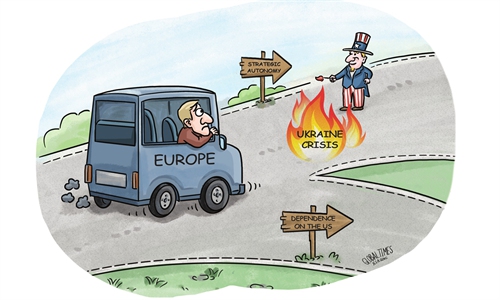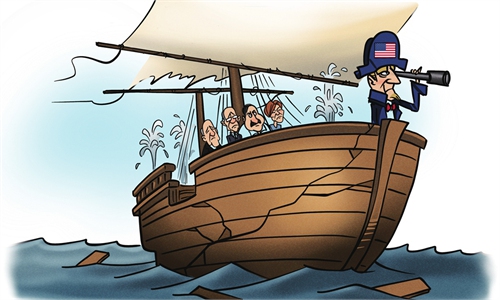
Illustration: Xia Qing/GT
On Friday, after some internal bargaining, the EU finally approved launching accession negotiations with Ukraine and Moldova. Hailed as a "historic step" by Ukraine's President Volodymyr Zelensky, this decision does bring Ukraine one step closer to the EU in procedure. However, Ukraine still has a long way to go to become a formal member of the EU, and the road ahead is not smooth. For the EU, showing political support to Ukraine by starting accession negotiations may bring new geopolitical and economic risks and introduce new variables to European integration.
The process of admitting new members to the EU can be roughly summarized as follows: application, becoming an official candidate for membership, opening formal membership negotiations, post-negotiation consultations, and formal admission, with the third stage of formal membership negotiations being considered the substantive stage. Against the backdrop of the Ukraine crisis, bringing Ukraine into the orbit of the EU is a key tool used by the EU to demonstrate political support and firmly bind Ukraine to the West. Ukraine has continuously set records in the first two stages of joining the EU. From February 2022, when it applied for EU membership, it took only about four months from applying to being accepted as a candidate country, and just about two years to start accession negotiations.
This special treatment of Ukraine has made other candidate countries "envious" and has also created significant contradictions within the EU. Some member states see this special treatment given to Ukraine as violating the existing accession rules and unfair to other candidate countries waiting patiently. The EU's political support for Ukraine currently outweighs considerations of maintaining accession rules and authority. However, these deep divisions will continue to be reflected in the upcoming accession negotiations and will be a constant obstacle for Ukraine in its future accession process.
First, the reality in Ukraine remains the biggest obstacle to its accession process. Until the Russia-Ukraine conflict is completely resolved and Ukraine's reconstruction begins, the EU is unlikely to seriously consider accepting Ukraine as a formal member. The accession process seems more like political bait for Ukraine than a choice that can bring tangible benefits and actual advantages to European integration.
Second, Ukraine is in a state of conflict where its political, economic, social and legal systems are all in wartime condition, making it difficult to measure up to the EU's routine standards. Although, formally, the EU may demand that Ukraine initiate a series of reforms to meet its requirements, it is hard to imagine Ukraine achieving full compliance. Given this backdrop, if the EU continues to offer preferential treatment to Ukraine and lowers acceptance standards, existing internal conflicts could escalate once more. More member states might reconsider or change their stance, considering the potential long-term political, economic and legal challenges of Ukraine's accession, particularly as some major EU member states still reflect on whether the initial enlargement was overly optimistic and hastily executed.
Ukraine's accession process and its outcomes will not only reshape the logic and form of European integration internally but also bring new uncertainties and risks to the EU in terms of security, economics and geopolitics. While Russia's stance on Ukraine joining the EU is relatively moderate compared to its staunch opposition to Ukraine joining NATO, this depends on the future directions of the EU itself and the state of EU-Russia relations. Under the dual influences of the Ukraine crisis and the EU's ambition for geopolitical transformation, the EU's shift toward securitization and militarization has become a significant change direction, with relations with Russia still in flux. Once the EU is perceived by Russia as a quasi-military organization expanding continuously, its security concerns will distinctly target the EU, significantly increasing the long-term tension or even comprehensive confrontation risks in EU-Russia relations.
Admitting Ukraine is seen by the EU as a crucial precondition for Ukraine to play a leading role in post-war reconstruction and gain economic benefits. However, the reality of the large funds, infrastructure capabilities and decision-making efficiency required for Ukraine's economic reconstruction is currently daunting, challenging the EU's economic situation, fiscal capacity and internal conflicts. If the interest calculation leading to Ukraine's post-war reconstruction cannot meet the EU's expectations, or potentially become a bottomless pit dragging down the EU economy, the EU's political enthusiasm for admitting Ukraine into the EU will likely diminish significantly.
The author is a professor at the Academy of Regional and Global Governance at Beijing Foreign Studies University. opinion@globaltimes.com.cn



